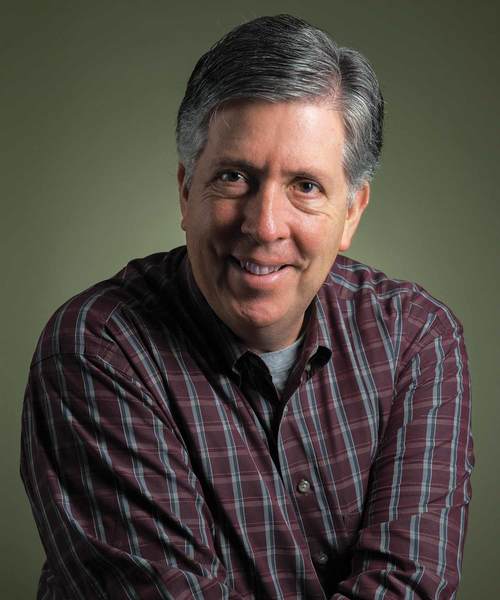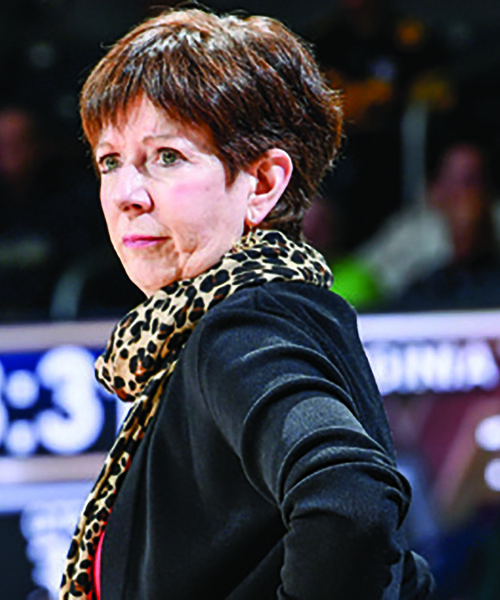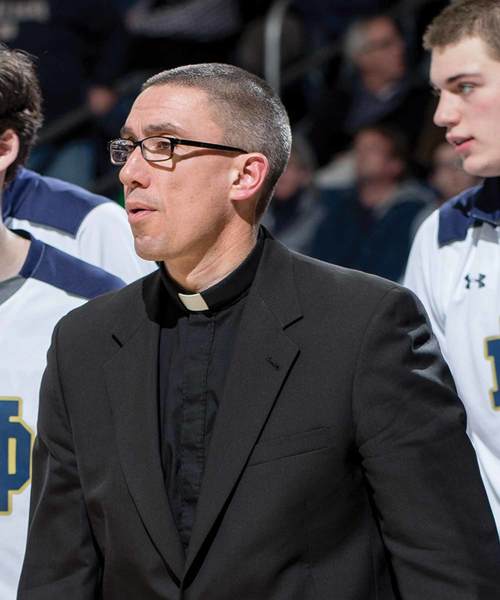
Gary Grassey
Back to the future
Former Irish basketball player Gary Grassey, who graduated from the University of Notre Dame in 1982 with an economics degree, owns a pretty impressive résumé.
He spent eight years working in management for CompuServe, more than five years in litigation for law firms in New York City and Boston, almost six years as a senior enforcement attorney of the U.S. Securities and Exchange Commission and another four years as vice president and associate general counsel at Fidelity Investments. Yet, the Huntington, New York, native always knew he’d eventually return to the classroom as a teacher and to the hardwood as a basketball coach.
During an interview for a feature story in a 1982 Irish basketball game program, the 6-8 senior walk-on told fellow Notre Dame sports information student writer Rick Chryst, “I guess I’ll probably end up going to law or MBA school. But my real long-range aspiration is to teach and coach.”
So, in 2008, nearly 26 years after that prophetic statement appeared in print, Grassey, with the blessing of wife Tara Kenney, also a 1982 Notre Dame graduate, took a giant leap of faith. He left the high-stress, fast-paced, relatively lucrative life of a corporate executive and attorney and went back to school so he could transition to a demanding, hectic and definitely not well-paying career of an eighth-grade U.S. history and English teacher.
“Tara and I were both working very stressful jobs, and we had three young sons,” Grassey said. “After we became parents, we moved from New York City to Boston in a partially successful effort to make our lives a bit less complex. I had been thinking about teaching for a very long time, and Tara was incredibly supportive. I also had talked to people who had made the switch to the classroom from both the law and business professions. I had investigated the pros and cons. We were both confident and comfortable with the decision.”
Grassey’s serendipitous path into education wasn’t the first time he took the unconventional route to follow his heart and passion.
Grassey played high school basketball at Huntington (New York) High School and received some interest from more than 40 colleges. Yet, not one offered a scholarship. So, Grassey chose Notre Dame and focused on academics. He satisfied his love of sports by serving as the head manager of the Irish soccer team as a freshman, joining the sports staff of The Observer, working as a student assistant in the sports information office and playing intramurals and Bookstore Basketball. During his first three years on campus, Grassey also participated in coach Digger Phelps’ annual walk-on tryout sessions. He never made the cut.
But the 1981–82 Irish team would be low on numbers. The power trio of Tracy Jackson, Kelly Tripucka and Orlando Woolridge was graduating, and center Joe Kleine transferred. Notre Dame’s projected roster featured veteran guards Mike Mitchell and John Paxson, center Tim Andree—and that was about it in terms of experience and depth.
In April of Grassey’s junior year, sports information director Roger Valdiserri called his student worker into the office. Grassey saw Phelps sitting in the extra chair. The young man who had given up his dream of playing varsity basketball for the Irish couldn’t believe what happened next.
“In his classic voice and without a whole bunch of pleasantries, Digger said, ‘Hey, I’ve heard some good things about you. Do you want to play on the team next year as a walk-on?’ After I managed to get, ‘Yes, coach,’ out of my mouth, he said I needed to promise him two things. First, because I was, at the time, a budding journalist, he wanted me to be loyal to the program and the team and not a source of news or rumors. Second, he told me I needed to get into the best shape of my life. That was it. From there I walked downstairs to (Irish track) coach (Joe) Piane’s office and asked him to give me a running program for the next six months. I figured if I was going to perform against Notre Dame basketball players, I’d need to be able to run like I’d never run before,” said Grassey.
There’s no fairy-tale ending here—Grassey didn’t become the leading scorer or guide the Irish to a heart-stopping run in the NCAA Championships. After five consecutive 20-win seasons, Notre Dame finished 10-17 in 1981–82. Yet, spending a year as an Irish student-athlete left an indelible impression on Grassey and taught him life lessons he still values today.
“Perhaps the most important thing I’ve carried from the experience is an incredible appreciation for the guys who have leveraged their experiences as Notre Dame student-athletes into success beyond their days at the University—whether in their professional careers, through their families or as shown through their willingness to serve others,” Grassey said. “So many of these guys are an inspiration. Tim Andree, Mike Mitchell, John Paxson and Marc Kelly are just a few examples. It’s not easy to play ball and be a student at Notre Dame. Success in balancing those two elements requires an enormous amount of discipline and sacrifice. My teammates and the guys who came before and after me have done some great things.”
Grassey’s innate sense of curiosity, love of learning and commitment to public service propelled him to change his career course even before his most recent foray into education. Because of his interest in policy matters and government, he left his first job in the business world to attend law school at Fordham University, ironically Notre Dame’s foe the night his senior-year feature appeared in the basketball game program. That led him to work at a New York City law firm where he helped defend clients who were the subject of government investigations by the SEC and other agencies.
After the family moved to Boston, Grassey switched legal sides and worked with the enforcement staff of the SEC, prosecuting violations of security laws for about six years. That experience also rekindled his desire to work in public service. He next joined Fidelity Investments and helped the company formulate its strategies and responses to investigations by securities regulators, including the SEC and other government agencies.
Life in Boston was good. Tara, who majored in political science and Spanish at Notre Dame, had earned her MBA in finance at New York University in 1991 and was working at Deutschebank Asset Management, directing the firm’s asset management business efforts in Latin America. Grassey liked his job. But as their sons became more and more involved in school activities and sports, managing schedules and finding time to breathe became more complicated. Grassey finally decided to answer the call to teaching that had been ringing in his ears for decades.
After taking an undergraduate course in child psychology, he took graduate courses at Salem State University and received his initial certificate in teaching. Then in his late 40s, he began the hunt for a position in his new field.
“Finding a job was much more difficult than I thought it would be,” Grassey said. “I had the will but not the experience.”
The principal at one of his sons’ schools suggested Grassey try substitute teaching to see if the fit was real. Coincidentally, one of the history teachers at the school took a maternity leave, and Grassey stepped into her classroom for a four-month tryout.
His son Jack, now a sophomore at Notre Dame, was in eighth grade at that school and a little nervous about now having his father in the same building with him all day long. Yet, the morning of Grassey’s first day, Jack, who had said very little about what was happening, walked into his father’s new classroom and said, “Dad, it’s going to be all right.”
And it was. Grassey enjoyed the challenge, the work and the students. He finished the substituting gig and then began teaching English and, eventually, his favorite subject—U.S. history—to eight-graders at Ephraim Curtis Middle School in Sudbury, Massachusetts. He’s now in his sixth year there.
“Teaching stretches you in so many different directions,” Grassey said. “It’s so challenging. You put in an incredible amount of prep time, and those 180 days that school is in session are intense. You are on stage all day long and working with children who have different sets of experiences, problems and learning styles. As a lawyer, the job was with me 24/7. As a teacher, it’s virtually the same during the school year.”
Grassey is one of three teachers who work together on a team in his school who came to education as a second career. A math teacher worked in marketing, and a science teacher was previously employed in the software industry. Grassey feels that experience helps the trio in the classroom.
“One of my units involves an in-depth study of the U.S. Constitution,” Grassey said. “I take the kids to the federal courthouse in Boston to watch trials and meet with judges. In class, we learn about their rights, we study cases that resonate with students and we examine current events in an effort to help bring the key concepts alive. I think they appreciate the fact there’s a lawyer in the room to offer some guidance and experience.”
Yet Grassey also admits he’s always looking for ways to become a better teacher and understand his impact on his pupils.
“One of the best pieces of advice I ever received was from a teacher who said kids will surprise you in ways you cannot predict and that I should never assume a student who struggles for much of the year won’t suddenly turn around and discover how to succeed as a learner,” he said. “The message was ‘Never give up on a kid.’
“During my second year, I’ll never forget the student who floundered along with low C’s and D’s and seemed to be lost when it came to academics. He was a kid who did not want to participate or engage at all during class. But one day, he stopped by my room and asked if he could receive some extra help after school. After a few sessions, he began to build some confidence in himself and to connect with the material. Toward the middle of the year, he was consistently doing B work, and he even began to raise his hand in class. A couple of years later, he came back to school for a visit and told me that the extra time he spent after school in my class really made a difference in his experience as a student. Whatever he does, whether in school or beyond, I think he will be a success in our community.”
As his sons were growing up, Grassey returned to his athletic roots and became involved in their youth basketball and baseball leagues as both a coach and a volunteer administrator. He’s coached at the travel and AAU level, but he always focuses on using sports as a way to teach children the values of teamwork, loyalty, perseverance and dedication. His primary goal is to make sure his teams have fun.
“As a coach, I can honestly say that one piece I took from Digger concerns preparation and detail,” Grassey said. “His attention to detail was remarkable. I suspect the kids who have played for me would say I focus on the details and doing things the right way, particularly during practice.
“But in the end, the best piece of advice I’ve ever heard about basketball was from my favorite high school coach who always reminds his players, ‘Love the game and it will love you back.’”
Grassey and Kenney, who serves on the board of directors for the Kellogg Institute for International Studies, have stayed connected to their alma mater in various ways since they graduated. They’ve helped recruit Notre Dame graduates to their respective employers and supported students and alumni in their efforts to network in their professional communities.
Having their eldest son as a student at Notre Dame (Michael is a senior and Patrick a freshman at Winchester High School) has strengthened the family’s already tight bond with the parents’ alma mater.
“Although many changes have taken place at Notre Dame, I have come to realize that the core values are still there,” Grassey said. “Notre Dame planted a seed and reinforced the idea of going forth and making a positive impact in the world. I’m still inspired by that as well as Tara’s work on various boards that provide services to women, children and schools in Latin America. Notre Dame is still emphasizing those values, which are much needed in today’s world.”
Grassey’s circuitous road to education may have offered a few twists and turns along the way, yet every stop helped prepare him for this current destination.
“I love working with kids, and I love what I’m doing,” Grassey said. “I’m going to stick with it.”

